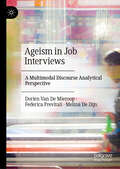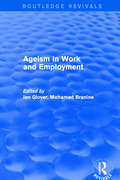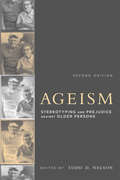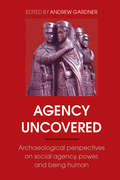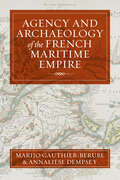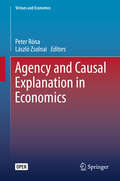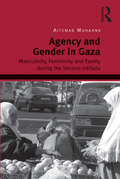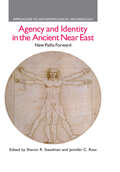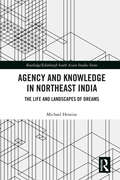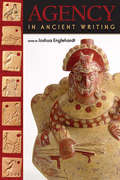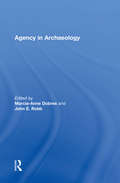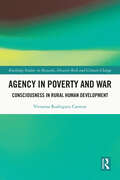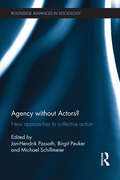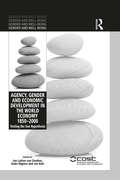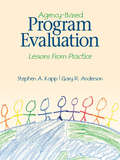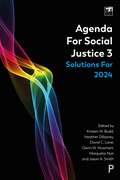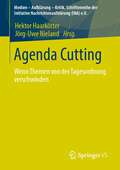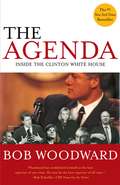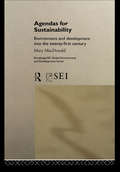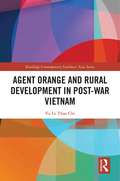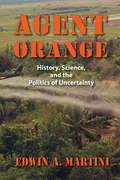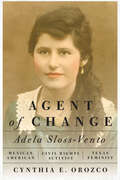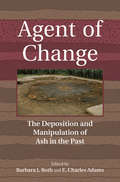- Table View
- List View
Ageism in Job Interviews: A Multimodal Discourse Analytical Perspective
by Dorien Van De Mieroop Federica Previtali Melina De DijnThis book investigates age categorizations and stereotyping in job interviews by drawing on a multimodal discourse analytical approach. While previous research on ageism has focused on what happens before or after the job interview, there is substantial evidence supporting the idea that the job interview is a pivotal moment in this respect as well. This is because the way in which the interaction unfolds significantly influences not only recruiters’ ultimate hiring decisions, but also candidates’ interest in pursuing the job offer further. This phase in the recruitment process is thus deserving of further scrutiny when it comes to ageism. The authors delve into age stereotypes regarding ‘old’ as well as ‘young’ age and tease out how they are ‘talked into being’ during job interviews, both by recruiters and candidates. By shedding light on the discursive dynamics of age-based prejudice, stereotyping and discrimination, this books thus aims to further understanding regarding how ageism actually plays out in in real life job interview interactions. The book will be of interest to academics working in fields including interactional sociolinguistics, pragmatics, diversity studies, human resource management and discursive psychology.
Ageism in Work and Employment (Routledge Revivals)
by Ian Glover and Mohamed BranineThis title was first published in 2001. This collection of essays on the the subject of ageism in work and employment arose out of the international conference held at Stirling University in July 1996. The book addresses various topics within this issue including the problem and its causes; the experience and practice of age discrimination in employment; and remedies and prospects.
Ageism: Stereotyping and Prejudice against Older Persons
by Todd NelsonCurrent research and theory from a range of disciplines on ageism, discussing issues from elder abuse to age discrimination against workers, revised and updated.People commonly use age to categorize and stereotype others–even though those who stereotype the elderly are eventually bound to become elderly themselves. Ageism is found cross-culturally, but it is especially prevalent in the United States, where most people regard growing older with depression, fear, and anxiety. Older people in the United States are stigmatized and marginalized, with often devastating consequences. This volume collects the latest theory and research on prejudice against older people, offering perspectives from psychology, nursing, medicine, social work, and other fields. The second edition has been completely updated, with new or extensively revised contributions. The contributors, all experts in their fields, consider issues that range from elder abuse to age discrimination against workers. There has been a relative dearth of research on ageism, perhaps because age prejudice is still considered socially acceptable. This book is still the only one that examines ageism in such detail, from such diverse scholarly perspectives. The contributors discuss the origins and effects of ageism and offer suggestions for how to reduce ageism as the wave of baby boomers heads for old age.
Agency Uncovered: Archaeological Perspectives on Social Agency, Power, and Being Human (UCL Institute of Archaeology Publications)
by Andrew GardnerThis book questions the value of the concept of 'agency', a term used in sociological and philosophical literature to refer to individual free will in archaeology. On the one hand it has been argued that previous generations of archaeologists, in explaining social change in terms of structural or environmental conditions, have lost sight of the 'real people' and reduced them to passive cultural pawns, on the other, introducing the concept of agency to counteract this can be said to perpetuate a modern, Western view of the autonomous individual who is free from social constraints. This book discusses the balance between these two opposites, using a range of archaeological and historical case studies, including European and Asian prehistory, classical Greece and Rome, the Inka and other Andean cultures. While focusing on the relevance of 'agency' theory to archaeological interpretation and using it to create more diverse and open-ended accounts of ancient cultures, the authors also address the contemporary political and ethical implications of what is essentially a debate about the definition of human nature.
Agency and Archaeology of the French Maritime Empire
by Marijo Gauthier-Bérubé and Annaliese DempseyThe French maritime empire enabled the continued colonization of territories all over the world from the 17th to the 19th centuries and was built upon the backs of those in lower socioeconomic classes. These classes were heavily impacted by social, political and economic structures. Detailed archaeological case studies using an agency perspective indicate that these lower socioeconomic classes were extremely diverse and dynamic groups that constantly negotiated their identities. These stories are not about the kings, military leaders, and politicians, but rather an exploration of the perspective of those who provided the fuel, both willingly and unwillingly, for the French maritime empire.
Agency and Causal Explanation in Economics (Virtues and Economics #5)
by László Zsolnai Peter RónaThis open access book provides an exploration of the consequences of the ontological differences between natural and social objects (sometimes described as objects of nature and objects of thought) in the workings of causal and agency relationships. One of its important and possibly original conclusions is that causal and agency relationships do not encompass all of the dependent relationships encountered in social life. The idea that social reality is contingent has been known (and largely undisputed) at least since Wittgenstein’s “On Certainty”, but social science, and most notably economics has continued to operate on the basis of causal and agency theories borrowed or adapted from the natural sciences. This volume contains essays that retain and justify the partial or qualified use of this approach and essays that totally reject any use of causal and agency theory built on determined facts (closed systems).The rejection is based on the possibly original claim that, whereas causation in the objects of the natural sciences reside in their properties, human action is a matter of intentionality. It engages with critical realist theory and re-examines the role of free will in theories of human action in general and economic theory in particular.
Agency and Gender in Gaza: Masculinity, Femininity and Family during the Second Intifada
by Aitemad MuhannaDrawing on rich interview material and adopting a life history approach, this book examines the agency of women living in insecure and uncertain conflict situations. It explores the effects of the Israeli policy of closure against Gaza and the resulting humanitarian crisis in relation to gender relations and gender subjectivity. With attention to the changing roles of men in the household and community as a result of the loss of male employment, the author explores the extension of poor women’s mobility, particularly that of young wives with dependent children, for whom the meaning of agency has shifted from being providers in the domestic sphere to becoming publicly dependent on humanitarian aid. Without conflating women’s agency with resistance to patriarchy, Agency and Gender in Gaza extends the concept of agency to include its subjective and intersubjective elements, shedding light on the recent distortion of the traditional gender order and the reasons for which women resist the masculine power that they have acquired as a result. An empirically grounded examination of the attempt to maintain the meaning of social existence through the preservation of socially constructed images of masculinity and femininity, this book will be of interest to social scientists with interests in gender studies, masculinities and the sociology of the family.
Agency and Identity in the Ancient Near East: New Paths Forward (Approaches To Anthropological Archaeology Ser.)
by Jennifer C. Ross Sharon R. SteadmanAgency theory examines the relationship between individuals or groups when one party is doing work on behalf of another. 'Agency and Identity in the Ancient Near East' offers a theoretical study of agency and identity in Near Eastern archaeology, an area which until now has been largely ignored by archaeologists. The book explores how agency theory can be employed in reconstructing the meaning of spaces and material culture, how agency and identity intersect, and how the availability of a textual corpus may impact on the agency approach. Ranging from the Neolithic to the Islamic period, 'Agency and Identity in the Ancient Near East' covers sites located in Turkey, Iraq, Syria, Jordan, Palestine, and Israel. The volume includes contributions from philology, art, history, computer simulation studies, materials science, and the archaeology of settlement and architecture.
Agency and Knowledge in Northeast India: The Life and Landscapes of Dreams (Routledge/Edinburgh South Asian Studies Series)
by Michael HeneiseThe Nagas of Northeast India give great importance to dreams as sources of divine knowledge, especially knowledge about the future. Although British colonialism, Christian missions, and political conflict have resulted in sweeping cultural and political transformations in the Indo-Myanmar borderlands, dream sharing and interpretation remain important avenues for negotiating everyday uncertainty and unpredictability. This book explores the relationship between dreams and agency through ethnographic fieldwork among the Angami Nagas. It tackles questions such as: What is dreaming? What does it mean to say ‘I had a dream’? And how do night-time dreams relate to political and social actions in waking moments? Michael Heneise shows how the Angami glean knowledge from signs, gain insight from ancestors, and potentially obtain divine blessing. Advancing the notion that dreams and dreaming can be studied as indices of relational, devotional, and political subjectivities, the author demonstrates that their examination can illuminate the ways in which, as forms of authoritative knowledge, they influence daily life, and also how they figure in the negotiation of day-to-day domestic and public interactions. Moreover, dream narration itself can involve techniques of ‘interference’ in which the dreamer seeks to limit or encourage the powerful influence of social ‘others’ encountered in dreams, such as ancestors, spirits, or the divine. Based on extensive ethnographic research, this book advances research on dreams by conceptualising how the ‘social’ encompasses the broader, co-extensive set of relations and experiences - especially with spirit entities - reflected in the ethnography of dreams. It will be of interest to those studying Northeast India, indigenous religion and culture, indigenous cosmopolitics in tribal India more generally, and the anthropology of dreams and dreaming.
Agency in Ancient Writing
by Joshua Englehardt"Through the lens of agency, contributors successfully rethink the nature of ancient texts. In so doing they ably demonstrate that when a new theoretical orientation is applied to a taken-for-granted category of data it invigorates both the data and our understanding of the past." --Marcia-Anne Dobres, University of MainIndividual agents are frequently evident in early writing and notational systems, yet these systems have rarely been subjected to the concept of agency as it is traceable in archeology. Agency in Ancient Writing addresses this oversight, allowing archeologists to identify and discuss real, observable actors and actions in the archaeological record. Embracing myriad ways in which agency can be interpreted, ancient writing systems from Mesoamerica, Mesopotamia, Egypt, Crete, China, and Greece are examined from a textual perspective as both archaeological objects and nascent historical documents. This allows for distinction among intentions, consequences, meanings, and motivations, increasing understanding and aiding interpretation of the subjectivity of social actors. Chapters focusing on acts of writing and public recitation overlap with those addressing the materiality of texts, interweaving archaeology, epigraphy, and the study of visual symbol systems. Agency in Ancient Writing leads to a more thorough and meaningful discussion of agency as an archaeological concept and will be of interest to anyone interested in ancient texts, including archaeologists, historians, linguists, epigraphers, and art historians, as well as scholars studying agency and structuration theory.
Agency in Ancient Writing
by Joshua EnglehardtIndividual agents are frequently evident in early writing and notational systems, yet these systems have rarely been subjected to the concept of agency as it is traceable in archeology. Agency in Ancient Writing addresses this oversight, allowing archeologists to identify and discuss real, observable actors and actions in the archaeological record. Embracing myriad ways in which agency can be interpreted, ancient writing systems from Mesoamerica, Mesopotamia, Egypt, Crete, China, and Greece are examined from a textual perspective as both archaeological objects and nascent historical documents. This allows for distinction among intentions, consequences, meanings, and motivations, increasing understanding and aiding interpretation of the subjectivity of social actors. Chapters focusing on acts of writing and public recitation overlap with those addressing the materiality of texts, interweaving archaeology, epigraphy, and the study of visual symbol systems. Agency in Ancient Writing leads to a more thorough and meaningful discussion of agency as an archaeological concept and will be of interest to anyone interested in ancient texts, including archaeologists, historians, linguists, epigraphers, and art historians, as well as scholars studying agency and structuration theory.
Agency in Archaeology
by John Robb Marcia-Anne DobresAgency in Archaeology is the first critical volume to scrutinise the concept of agency and to examine in-depth its potential to inform our understanding of the past. Theories of agency recognise that human beings make choices, hold intentions and take action. This offers archaeologists scope to move beyond looking at broad structural or environmental change and instead to consider the individual and the group Agency in Archaeology brings together nineteen internationally renowned scholars who have very different, and often conflicting, stances on the meaning and use of agency theory to archaeology. The volume is composed of five theoretically-based discussions and nine case studies, drawing on regions from North America and Mesoamerica to Western and central Europe, and ranging in subject from the late Pleistocene hunter-gatherers to the restructuring of gender relations in the north-eastern US.
Agency in Poverty and War: Consciousness in Rural Human Development (Routledge Studies in Hazards, Disaster Risk and Climate Change)
by Vivianna Rodriguez CarreonThis book examines how people's self-awareness is affected by both internal and external factors amid war and poverty. It explores how agency has influenced the inward human development of rural women who face triple disadvantages related to gender, ethnicity, and access to economic power.It presents a multidisciplinary perspective on the intersection of war and poverty through narratives of surviving women. It advances understandings of how rural people, peasants, and Indigenous Peoples of Peru, particularly women, have experienced poverty and war as a combination of oppression, repression, and aggression. It explores their agency is affected and how it evolves during and after conflict in their search for truth and justice. It does this by taking the capability approach combined with insights from perspectives on raising consciousness and inner transformation in human development in which awareness of rural people’s experience enables them to be free and can move them from survival to conscious agents.This book offers new narratives to evaluate the hazards of poverty and war and the potential human security for rural people agency and empowerment in building peace. It will be of interest to scholars and practitioners of development studies, peace and security, political Latin America geography, rural communities, peace and conflict studies, human development and political studies.
Agency without Actors?: New Approaches to Collective Action (Routledge Advances in Sociology)
by Jan-Hendrik Passoth Michael Schillmeier Birgit PeukerThe question of agency is a key issue in social theory and research. The discourse of human agency as an effect of social relations is deeply intertwined with the history of sociological thought. However, in most recent discussions the role of non-humans gains a substantial impact concerning agency. Agency without Actors? New Approaches to Collective Action asks: Are nonhumans active, do they have agency? And if so: how and in which different ways? Consequently, Agency without Actors? New Approaches to Collective Action outlines a wide range of novel accounts that link human and non-human agency tries to understand social-technical, political and environmental networks as different forms of agency that produce discrete and identifiable entities asks how different types of (often conflicting) agency and agents are distinguished in practice, how they are maintained and how they interfere with each other. By studying the substantial impact of the role of non-humans in connection with human relations, the book aims to advance the discourse on agency and investigates into the different possible modes of human and nonhuman interplay. This book is essential reading for students and scholars of sociology, science and technology studies, social anthropology, animal studies, environmental studies and social theory.
Agency, Gender and Economic Development in the World Economy 1850–2000: Testing the Sen Hypothesis (Gender and Well-Being)
by Jan Luiten van Zanden Auke Rijpma Jan KokHow has ‘agency’ – or the ability to define and act upon one’s goals – contributed to global long-term economic development during the last 150 years? This book asserts that autonomous decision making, and female agency in particular, increases the potential of a society to generate economic growth and improve its institutions. Inspired by Amartya Sen’s capabilities approach and looking at this in comparison to contemporary economic theory, the collection of chapters tackles the issue of agency from the micro level of household and family formation and asks how this applies to gender at regional and state level. It brings to the fore new empirical data from across the globe to test the links between family systems, female agency, human capital formation, political institutions and economic development and puts these into broader historical context. It will appeal to scholars researching social policy, gender studies, economic history, development studies and philosophy, as well anyone with interests in the long-term societal development of the world economy and issues of global inequality.
Agency-Based Program Evaluation: Lessons From Practice
by Gary R. Anderson Stephen A. KappThis text aids both students and practitioners in articulating the elements of program evaluation, deepening their understanding of the contextual issues that surround and shape an evaluation. Authors Stephen A. Kapp and Gary R. Anderson offer readers details on the application of useful and accepted evaluation methods. It also shows readers how to make sound decisions in balancing techniques and strategies with the realities of the agency environment. Key Features Ethical considerations related to collecting data from service consumers and working with agency personnel Strategies for accommodating cultural and ethnic differences when collecting program evaluation data Techniques for engaging agency personnel and key constituents in the entire evaluation process Accompanied by robust ancillaries This text is accompanied by a robust companion site. The password-protected Instructor′s Site features: Sample Syllabi PowerPoint Slides Test Bank The open-access Student Study Site offers: Quizzes Journal Articles Web Resources and Activities This text is designed for upper-level undergraduate and graduate courses in program evaluation within departments of social work, mental health, and human services. It is also a great resource for practicing professionals, supervisors, and managers.
Agenda for Social Justice 3: Solutions for 2024 (SSSP Agendas for Social Justice)
by Sophie Webb Teresa A. Sullivan Dana Johnson Blake R. Silver Katie Kerstetter Gabriela Gonzalez Ashley C. Rondini Ashley N. Gwathney Brooke Cordes Charity Anderson Drew Bonner Elroi Windsor Hayley Carlisle Jeanne Kimpel Kristen Burke Lance Hannon Lindsay Redditt McKenzie Berezin Meredith Van Natta Monique Harrison Nazgol Ghandnoosh Raquel Rose Sarah Jane Brubaker Sydney Ingel Tiffany Joseph Tony Samara Mary BernsteinThe Agenda for Social Justice 3: Solutions for 2024 provides accessible insights into some of the most pressing social problems and proposes public policy responses to those problems. Written by a highly respected team of authors brought together by the Society for the Study of Social Problems (SSSP), the book offers recommendations for action by elected officials, policymakers and the public regarding key issues for social justice. Chapters include discussion of social problems related to criminal justice, the economy, food insecurity, education, healthcare, housing and immigration. The book will be of interest to scholars, practitioners, advocates and students interested in public sociology, the study of social problems and the pursuit of social justice.
Agenda-Cutting: Wenn Themen von der Tagesordnung verschwinden (Medien – Aufklärung – Kritik. Schriftenreihe der Initiative Nachrichtenaufklärung (INA) e.V.)
by Jörg-Uwe Nieland Hektor HaarkötterWenn von Nachrichtenauswahl und Thematisierungsfunktion der Medien die Rede ist, fällt schnell das Fachwort Agenda-Setting. Der gegenteilige Begriff, das Agenda-Cutting, ist dagegen viel seltener Gegenstand von wissenschaftlichen oder gesellschaftlichen Diskussionen. Dabei ist das Agenda-Cutting eine weitflächig geübte Praxis in Medien, Politik und Gesellschaft, bei der Themen bewusst oder unbewusst aus den gesellschaftlichen Diskursen entfernt oder herausgehalten werden. Die Initiative Nachrichtenaufklärung beschäftigt sich schon lange intensiv mit der Frage der Vernachlässigung von Themen und Nachrichten. Mit diesem Sammelband wird erstmals das Thema wissenschaftlich tiefgehend von verschiedenen Seiten aus betrachtet.
Agenda: Inside the Clinton White House
by Bob WoodwardThe Agendais a day-by-day, often minute-by-minute account of Bill Clinton's White House. Drawing on hundreds of interviews, confidential internal memos, diaries, and meeting notes, Woodward shows how Clinton and his advisers grappled with questions of lasting importance -- the federal deficit, health care, welfare reform, taxes, jobs. One of the most intimate portraits of a sitting president ever published, this edition includes an afterword on Clinton's efforts to save his presidency.
Agendas for Sustainability: Environment and Development into the 21st Century (Routledge/SEI Global Environment and Development Series)
by Mary MacDonaldAgendas and Sustainability considers the processes used for devising global environment and development agendas and provides practical suggestions for their future development and influence. A collaboration of the latest research from the Stockholm Environment Institute and the Earth Council, the book presents similarities and differences in problem definition, objectives, principles, priorities and actions across eleven of the major agendas put forward for environment and development after Rio. Points of divergence and areas of common ground are investigated for over 30 environment and development-related topics, such as biodiversity, consumption patterns, trade, urbanization, population, education, deforestation and water resources.
Agent Orange and Rural Development in Post-war Vietnam (Routledge Contemporary Southeast Asia Series)
by Vu Le Thao ChiVu tells the story of Vietnamese farmers who have survived a 30-year war of independence and unification, its damaging legacies in their living environment, and the unfamiliar pressure of the market economy. Vietnamese famers are neither simply obedient beneficiaries of policy decisions made by higher authorities nor convention-ridden cyphers. Rather, they are sophisticated decision-makers capable of navigating the changes threatening to disrupt their lives over multiple generations. Vu’s research pays particular attention to those farmers whose families have suffered from direct and indirect exposure to the toxic herbicides popularly known as Agent Orange. She demonstrates that their priority has tended to be the protection of their existing assets, rather than pursuing the promise of new riches, and that this tendency has helped them maintain stability in a turbulent economic environment. A fascinating study for scholars of Vietnamese anthropology and society, the book will also be of interest to sociologists and economists with a broader interest in the impact of economic and political change on rural lifestyles.
Agent Orange: History, Science, and the Politics of Uncertainty
by Edwin A. MartiniTaking on what one former U.S. ambassador called "the last ghost of the Vietnam War," this book examines the far-reaching impact of Agent Orange, the most infamous of the dioxin-contaminated herbicides used by American forces in Southeast Asia. Edwin A. Martini's aim is not simply to reconstruct the history of the "chemical war" but to investigate the ongoing controversy over the short- and long-term effects of weaponized defoliants on the environment of Vietnam, on the civilian population, and on the troops who fought on both sides. Beginning in the early 1960s, when Agent Orange was first deployed in Vietnam, Martini follows the story across geographical and disciplinary boundaries, looking for answers to a host of still unresolved questions. What did chemical manufacturers and American policymakers know about the effects of dioxin on human beings, and when did they know it? How much do scientists and doctors know even today? Should the use of Agent Orange be considered a form of chemical warfare? What can, and should, be done for U.S. veterans, Vietnamese victims, and others around the world who believe they have medical problems caused by Agent Orange? Martini draws on military records, government reports, scientific research, visits to contaminated sites, and interviews to disentangle conflicting claims and evaluate often ambiguous evidence. He shows that the impact of Agent Orange has been global in its reach affecting individuals and communities in New Zealand, Australia, Korea, and Canada as well as Vietnam and the United States. Yet for all the answers it provides, this book also reveals how much uncertainty--scientific, medical, legal, and political--continues to surround the legacy of Agent Orange.
Agent of Change: Adela Sloss-Vento
by Cynthia E. OrozcoThe essayist Adela Sloss-Vento (1901–1998) was a powerhouse of activism in South Texas&’s Lower Rio Grande Valley throughout the Mexican American civil rights movement beginning in 1920 and the subsequent Chicano movement of the 1960s and 1970s. At last presenting the full story of Sloss-Vento&’s achievements, Agent of Change revives a forgotten history of a major female Latina leader. Bringing to light the economic and political transformations that swept through South Texas in the 1920s as ranching declined and agribusiness proliferated, Cynthia E. Orozco situates Sloss-Vento&’s early years within the context of the Jim Crow/Juan Crow era. Recounting Sloss-Vento&’s rise to prominence as a public intellectual, Orozco highlights a partnership with Alonso S. Perales, the principal founder of the League of United Latin American Citizens. Agent of Change explores such contradictions as Sloss-Vento&’s tolerance of LULAC&’s gender-segregated chapters, even though the activist was an outspoken critic of male privilege in the home and a decidedly progressive wife and mother. Inspiring and illuminating, this is a complete portrait of a savvy, brazen critic who demanded reform on both sides of the US-Mexico border.
Agent of Change: The Deposition and Manipulation of Ash in the Past
by Barbara J. Roth E. Charles AdamsAsh is an important and yet understudied aspect of ritual deposition in the archaeological record of North America. Ash has been found in a wide variety of contexts across many regions and often it is associated with rare or unusual objects or in contexts that suggest its use in the transition or transformation of houses and ritual features. Drawn from across the U.S. and Mesoamerica, the chapters in this volume explore the use, meanings, and cross-cultural patterns present in the use of ash. and highlight the importance of ash in ritual closure, social memory, and cultural transformation.
Agent of Change: The Deposition and Manipulation of Ash in the Past
by Barbara J. Roth and E. Charles AdamsAsh is an important and yet understudied aspect of ritual deposition in the archaeological record of North America. Ash has been found in a wide variety of contexts across many regions and often it is associated with rare or unusual objects or in contexts that suggest its use in the transition or transformation of houses and ritual features. Drawn from across the U.S. and Mesoamerica, the chapters in this volume explore the use, meanings, and cross-cultural patterns present in the use of ash. and highlight the importance of ash in ritual closure, social memory, and cultural transformation.
